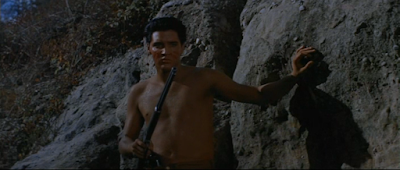Flaming Star (Don Siegel, 1960) So, not seeing many Elvis Presley movies—a fan of his music, and his stage performance, but not so much of the "programmers" that Col. Parker insisted he make—I've always wondered about his potential as an actor. He was a great admirer of James Dean, and there's "talk" about how good he was, but there isn't much proof of that in his movies, where he's given songs to sing every ten minutes or so and he's given a persona that comes down to "Elvis with a job," merely. Not much to work with, and certainly no room to grow beyond the parameters of what was expected, and though he kept working on them (at the Colonel's insistence), he grew tired of them—they weren't challenging and were basically fluff for fans. They still have fans to this day—those movies crop up on "Elvis festivals" all the time—but nobody (except those same fans) would consider them great films. What's great about them is Presley and frequently the only reason to see them. Him and the songs.
But, Flaming Star was a chance to break the mold. Elvis sings a couple songs at the beginning and that's it—they're disposed of quickly. This one has a story, a good "theme" backing that story, and a terrific director, Don Siegel, who was still making B-pictures, but good ones that would become classics like Invasion of the Body Snatchers, and he would make The Killers, Coogan's Bluff, Madigan, The Beguiled, Dirty Harry, Escape from Alcatraz, The Shootist. He was a quick filmmaker and "cut in his head," imagining just the camera-angles and enough footage to make the splices go by unnoticed (a skill he'd honed working for the Warner studio in the editing department—you can see his name in the credits for "montage" on Casablanca, Now, Voyager, They Drive By Night and Edge of Darkness).
The setting is Texas in 1878 and two brothers, Clint (Steve Forrest) and Pacer Burton (Elvis Presley) are approaching their family cabin warily as all is quiet and dark even though it is still evening. There is tension in the air as the nearby Kiowa tribe has a new chief, Buffalo Horn (Rodolfo Acosta), having replaced the old chief of the tribe, and there have been aggressive attacks to take back their traditional hunting grounds, now "settled" by whites. But, despite drawn guns and quickening pulses, they find that the lights are out for a surprise birthday party for Clint (belated though it is).
Of course, the party is hosted by Clint's father Sam (John McIntire) and his step-mother Neddy (Dolores Del Río), a Kiowa woman and mother of Pacer, but also in attendance are Clint's fancier (Barbara Eden replacing a dismissed Barbara Steele), as well as characters played by Richard Jaeckel
and L.Q. Jones (briefly).Briefly, because after the party breaks up for the night, three of the returning party are killed by Kiowa warriors when "the Howard place" is attacked in the middle of the night. Being isolated, the Burtons don't hear of it until Clint and Pacer ride into town for supplies and are nearly set upon by the Pierces (Jaeckel and Eden) for even setting foot in their place—Pacer being half-Kiowa. They manage to get what they need, but the hatred towards Pacer by association lets them know that the entire Burton clan is not going to have an easy time of it, from the settlers in town or from the Kiowas (Buffalo Horn already having made a nighttime visit to their homestead to palaver with Pacer).
It's only emphasized when a posse hunting Buffalo Horn visit the Burtons with one question—whose side are they on? Tempers are high with the men referring to Clint as "the only white man in the family" and shots are fired when things get too heated. The next morning, Pa and Clint find that the posse has stampeded their cattle and shot them all down out of spite, prompting Clint to vent that the white are worse than the Kiowas—"An Indian will rob you blind if he can but this is all waste and meanness." The Burtons are in an extreme situation, but where Pa says they've always been, "folks in the middle."This is an atypical Elvis vehicle (which were basic celebrity vehicles) but not an atypical Western for the time in which it was made, on the cusp of a society-changing civil rights movement, where hearts and minds were in a process of retrospection of the country and what it's ideals really meant. Considerate directors who had moved beyond the early tropes of "cowboy movies" and considered not only the challenges of the European western expansion, but also its costs...and it's crimes. History is more complex than the dictates of a popular entertainment, and Flaming Star slots perfectly well in the genre's still-early reappraisal.But not for an Elvis vehicle. But, Presley, fresh out of his military service, rises to the challenge. In his previous movies...and future ones...he wasn't required to do much but be a version of his star persona. If anything the range only required a befuddlement over who his next dance-partner would be.
But, this role requires a stretch, far beyond the dictates of a musical format...he's embattled, hated, conflicted, and constantly challenged, all of which comes through without an audience having to compensate for his celebrity. And, although helped by a fine crew of stuntman, he's also good in the action sequences (especially in a vigorous and violent third act). It's a terrific performance, far beyond what you'd come to expect from one of his similarly mononomic contemporaries. For a similar performance, look at the best movie-work of Dean Martin, Bobby Darin, or Sinatra. It was what he aspired to, and though he may be best remembered for his rock n' rollin' higher profile films, this was him at his dramatic best.










No comments:
Post a Comment